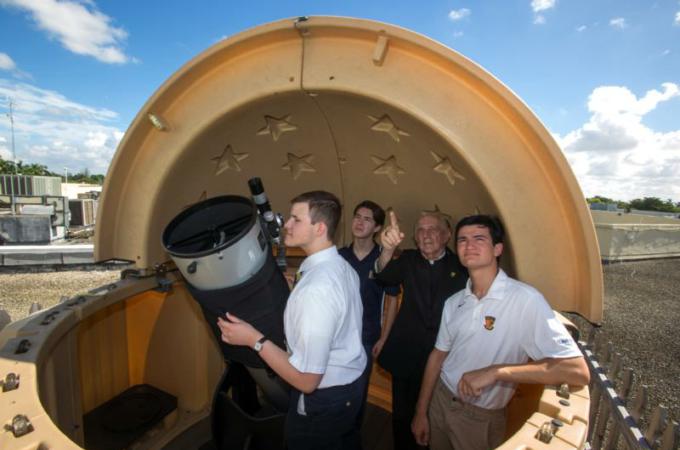Miami's Catholic school observatory is set for eclipse
MIAMI (CNS) -- The student observatory at Belen Jesuit Preparatory School is eagerly awaiting the solar eclipse.
Although Miami is not in the so-called "zone of totality," the region will be in the path of 80 percent of the sun's visibility at the peak of the Aug. 21 eclipse.
"This eclipse is something that will be a wonderful experience for Miami; the most important thing is it will cover 80 percent of the sun and we must be careful not to look at the sun without special filters and special glasses," said Jesuit Father Pedro Cartaya, a spiritual counselor at Belen and founder of the observatory and the student astronomy club begun here in the 1980s.
The priest, a native of Havana, will coordinate some 20 astronomy club student members and alumni watching and documenting the solar eclipse with a series of telescopes modified to safely observe -- and even document -- the phenomenon.
In March 1970, Father Cartaya said, he was in Perry, Florida, to observe a rare total solar eclipse that moved through Central America and the North Florida region that year.
"It was an amazing experience I will not forget," he told the Florida Catholic, Miami's archdiocesan newspaper. "A lot of astronomers from around the world were there; it was so dark."
The observatory at Belen, which includes an array of 11 telescopes, is among the best of its kind among high schools and will be accessible only to the Belen student astronomers and related faculty during the eclipse.
Michael Cairo, a class of 2016 graduate of Belen and physics major at the College of William and Mary in Virginia, will still be on summer break in Florida for the eclipse and planned to assist at Belen Aug. 21 in his capacity as a former president of the astronomy club.
The club is purely a voluntary student association for budding astronomy buffs and not officially associated with coursework and credits at Belen.
"This is pretty significant: Lunar eclipses are fairly common and I have seen about five of them but this solar eclipse happening around the continental U.S. is rare and I will remember this one," said Cairo, who had been a member of the prep school's astronomy club since he was a sixth-grader.
The club has ordered some 20 pairs of special protective solar viewing glasses and the telescopes will be outfitted with solar filters and shielding, some of which they have used in the past to view and study the surface of the sun. One of the former club members also will be on hand to photograph the event.
"Belen is lucky to have a full observatory to see this and I am lucky to be here when it happens. Actually, the observatory at Belen is more complete than the one at my college, so I will get the best experience here," Cairo said.
Ninth-grader Danny Jimenez, 14, past president of the astronomy club's junior division, got his first telescope around the fifth grade and now hopes to go on to a career in astrophysics and maybe even work for NASA.
"I thought it would be good to learn about that field, and by observing the sky we learn about the vast universe we have," Danny said.
Father Cartaya said he is proud of all his astronomy club students over the years and that a deep study of science and the natural world comes as a natural exercise for a Christian.
"We have a long tradition in our Jesuit order to work in the sciences and the more you dedicate to the sciences the closer you get to God and faith in God," the priest said.
- - -
Tracy is a correspondent for the Florida Catholic, newspaper of the Archdiocese of Miami.



















